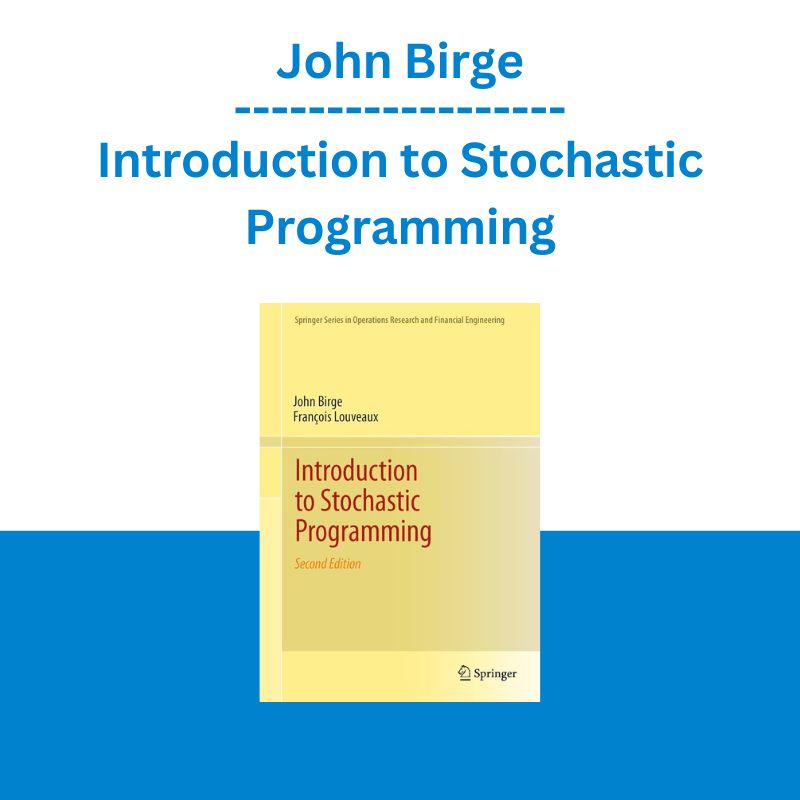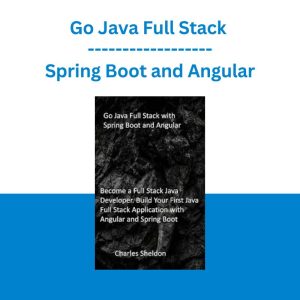*** Proof of Product ***
Exploring the Essential Features of “John Birge – Introduction to Stochastic Programming”
Authors: John R. Birge ,
François Louveaux
Well-paced and wide-ranging introduction to this subject
Prime goal is to help students develop an intuition on how to model uncertainty into mathematical problems
Provides a first course in stochastic programming suitable for students
Part of the book series: Springer Series in Operations Research and Financial Engineering (ORFE)
Sections
Table of contents
About this book
Keywords
Reviews
Authors and Affiliations
About the authors
Bibliographic Information
Table of contents (10 chapters)
Models
Front Matter
Pages 1-1
Introduction and Examples
John R. Birge, François Louveaux
Pages 3-54
Uncertainty and Modeling Issues
John R. Birge, François Louveaux
Pages 55-100
Basic Properties
Front Matter
Pages 101-101
Basic Properties and Theory
John R. Birge, François Louveaux
Pages 103-161
The Value of Information and the Stochastic Solution
John R. Birge, François Louveaux
Pages 163-177
Solution Methods
Front Matter
Pages 179-179
Two-Stage Recourse Problems
John R. Birge, François Louveaux
Pages 181-263
Multistage Stochastic Programs
John R. Birge, François Louveaux
Pages 265-287
Stochastic Integer Programs
John R. Birge, François Louveaux
Pages 289-338
Approximation and Sampling Methods
Front Matter
Pages 339-339
Evaluating and Approximating Expectations
John R. Birge, François Louveaux
Pages 341-387
Monte Carlo Methods
John R. Birge, François Louveaux
Pages 389-415
Multistage Approximations
John R. Birge, François Louveaux
Pages 417-448
Back Matter
Pages 449-485
About this book
The aim of stochastic programming is to find optimal decisions in problems which involve uncertain data. This field is currently developing rapidly with contributions from many disciplines including operations research, mathematics, and probability. At the same time, it is now being applied in a wide variety of subjects ranging from agriculture to financial planning and from industrial engineering to computer networks. This textbook provides a first course in stochastic programming suitable for students with a basic knowledge of linear programming, elementary analysis, and probability. The authors aim to present a broad overview of the main themes and methods of the subject. Its prime goal is to help students develop an intuition on how to model uncertainty into mathematical problems, what uncertainty changes bring to the decision process, and what techniques help to manage uncertainty in solving the problems.
In this extensively updated new edition there is more material on methods and examples including several new approaches for discrete variables, new results on risk measures in modeling and Monte Carlo sampling methods, a new chapter on relationships to other methods including approximate dynamic programming, robust optimization and online methods.
The book is highly illustrated with chapter summaries and many examples and exercises. Students, researchers and practitioners in operations research and the optimization area will find it particularly of interest.
Review of First Edition:
“The discussion on modeling issues, the large number of examples used to illustrate the material, and the breadth of the coverage make ‘Introduction to Stochastic Programming’ an ideal textbook for the area.” (Interfaces, 1998)
Reviews
From the reviews of the second edition:
“Help the students to understand how to model uncertainty into mathematical optimization problems, what uncertainty brings to the decision process and which techniques help to manage uncertainty in solving the problems. … certainly attract also the wide spectrum of readers whose main interest lies in possible exploitation of stochastic programming methodology and will help them to find their own way to treat actual problems using stochastic programming methods. As a whole, the three main building blocks of stochastic programming … are well represented and balanced.” (Jitka Dupačová, Zentralblatt MATH, Vol. 1223, 2011)
Authors and Affiliations
, Booth School of Business, University of Chicago, Chicago, USA
John R. Birge
, Department of Business Administration, University of Namur, Namur, Belgium
François Louveaux
About the authors
John R. Birge, is a Jerry W. and Carol Lee Levin Professor of Operations Management at the University of Chicago Booth School of Business. François Louveaux is a Professor at the University of Namur(FUNDP) in the Department of Business Administration
Please see the full list of alternative group-buy courses available here: https://lunacourse.com/shop/










 Sovereign Man Confidential - Renunciation Video
Sovereign Man Confidential - Renunciation Video  Racing Workshop - Complete Online Package
Racing Workshop - Complete Online Package  Emanuele Bonanni - My Trading Way
Emanuele Bonanni - My Trading Way  Matan Feldman - The 13-Week Cash Flow Modeling - Wall Street Prep
Matan Feldman - The 13-Week Cash Flow Modeling - Wall Street Prep  Atlas API Training - API 570 Exam Prep Training Course
Atlas API Training - API 570 Exam Prep Training Course  Money Miracle - George Angell - Use Other Peoples Money To Make You Rich
Money Miracle - George Angell - Use Other Peoples Money To Make You Rich  Simpler Trading - Bruce Marshall - The Options Defense Course
Simpler Trading - Bruce Marshall - The Options Defense Course  George Fontanills & Tom Gentile - Optionetics Wealth Without Worry Course
George Fontanills & Tom Gentile - Optionetics Wealth Without Worry Course  Chris Capre - Advanced Price Action Ongoing Training & Webinars
Chris Capre - Advanced Price Action Ongoing Training & Webinars  Forexmentor - Recurring Forex Patterns
Forexmentor - Recurring Forex Patterns  Toshko Raychev - Profit System + ITF Assistant
Toshko Raychev - Profit System + ITF Assistant  SMB - Options Training
SMB - Options Training  Julie Stoian & Cathy Olson - Launch Gorgeous - Funnel Gorgeous Bundle
Julie Stoian & Cathy Olson - Launch Gorgeous - Funnel Gorgeous Bundle  Crypto Dan - The Crypto Investing Blueprint To Financial Freedom By 2025
Crypto Dan - The Crypto Investing Blueprint To Financial Freedom By 2025  George Fontanills & Tom Gentile - Optionetics 6 DVD Series Home Study Course (Digital Download)
George Fontanills & Tom Gentile - Optionetics 6 DVD Series Home Study Course (Digital Download)  Greg Loehr - Advanced Option Trading With Broken Wing Butterflies
Greg Loehr - Advanced Option Trading With Broken Wing Butterflies  Go Java Full Stack - Spring Boot and Angular
Go Java Full Stack - Spring Boot and Angular  Ed Ponsi - Forex Trading
Ed Ponsi - Forex Trading